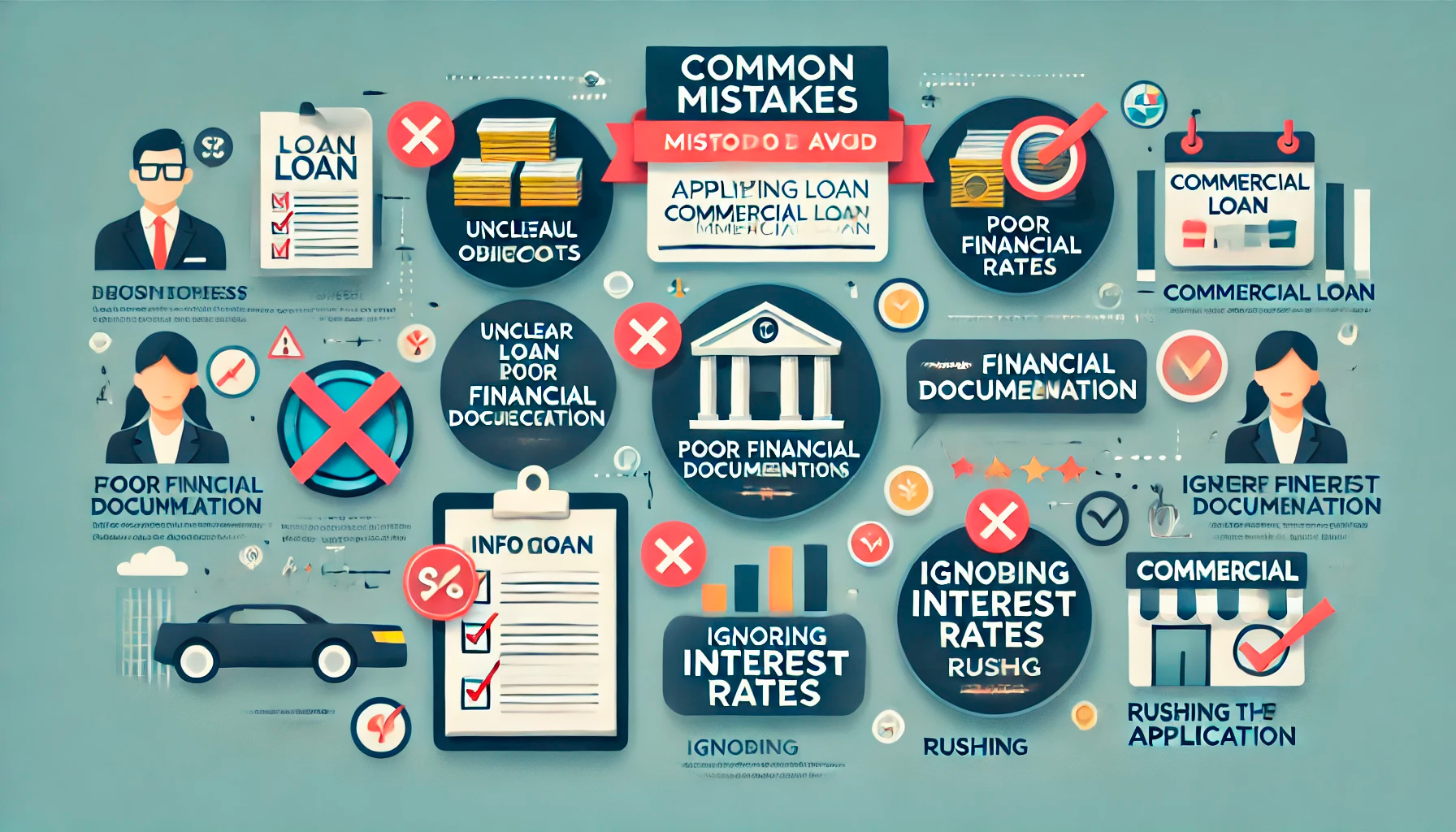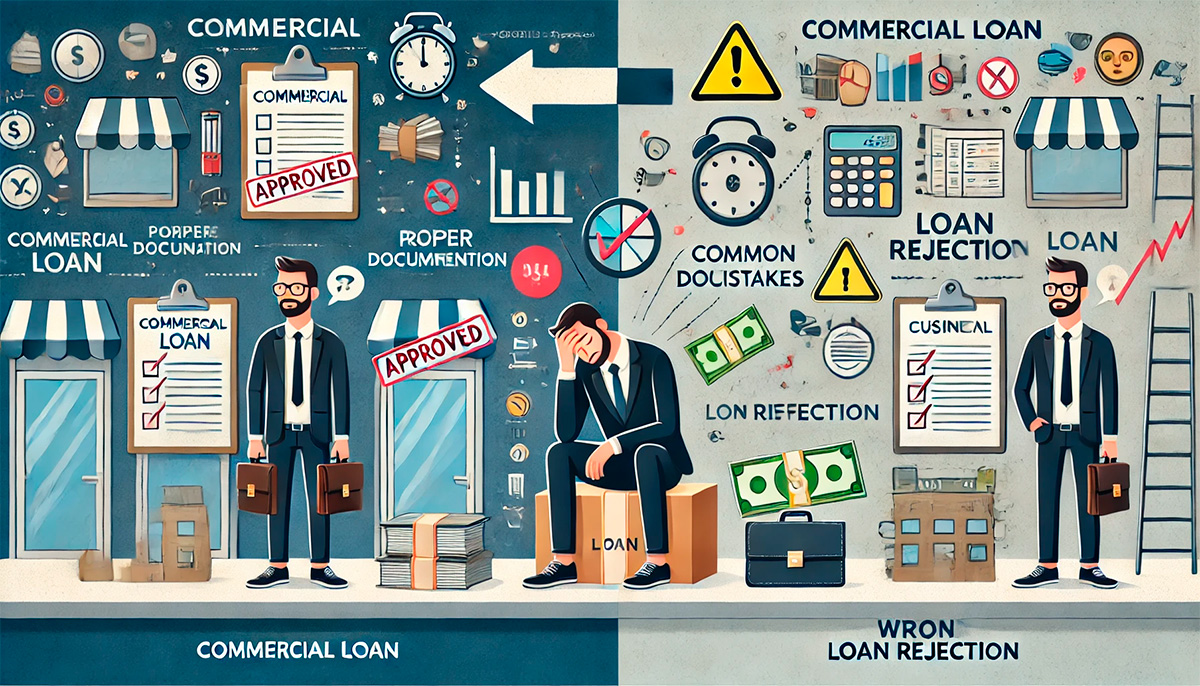
Common Mistakes to Avoid When Applying for a Commercial Loan
Applying for a commercial loan is a critical step in securing the financial resources your business needs to grow and thrive. However, the process can be complex, and even small errors can lead to delays, higher costs, or outright denial. Understanding common mistakes and how to avoid them can increase your chances of success and help you secure the most favorable terms.
This guide explores the pitfalls many business owners encounter when applying for commercial loans and provides actionable strategies to navigate the process effectively.
Failing to Clearly Define Loan Objectives
One of the most common mistakes is not having a clear purpose for the loan. Lenders want to understand how you plan to use the funds and how they will benefit your business. Applying for a loan without a well-defined objective can signal a lack of preparation and reduce your credibility.
To avoid this mistake, prepare a detailed plan outlining the purpose of the loan. Whether it’s for expanding operations, purchasing equipment, or managing cash flow, provide specifics about how the funds will be allocated and how they will contribute to your business’s growth. A clearly articulated purpose not only strengthens your application but also helps you determine the exact loan amount required, preventing over-borrowing.
Underestimating Financial Documentation Requirements
Lenders require a comprehensive view of your business’s financial health to evaluate your ability to repay the loan. Many applicants make the mistake of submitting incomplete or inaccurate financial records, which can lead to delays or rejection.
Ensure you have up-to-date financial documents, including profit and loss statements, balance sheets, tax returns, and cash flow projections. Organize these records in a professional format to demonstrate your preparedness and commitment to transparency. Additionally, being proactive about addressing any financial discrepancies or weaknesses in advance shows lenders that you take financial management seriously.
Overlooking Credit History
Your credit history, both personal and business, plays a significant role in loan approval. Some business owners neglect to review their credit reports before applying, only to discover issues that could have been resolved in advance.
Request and review your credit reports from major credit bureaus, ensuring there are no errors or inaccuracies. Address any outstanding debts or discrepancies to improve your credit score and increase your chances of securing favorable loan terms. Building a strong credit history before applying for a loan is one of the most effective ways to enhance your eligibility.

Applying for the Wrong Type of Loan
Not all commercial loans are created equal, and choosing the wrong type can lead to higher costs or mismatched terms. Business owners often apply for loans without fully understanding the options available or selecting one that aligns with their specific needs.
Research different loan types, such as term loans, lines of credit, SBA loans, or equipment financing. Match the loan type to your objectives and repayment capacity to ensure it supports your business strategy effectively. Consulting with a financial advisor or lender about your goals can help you identify the most appropriate loan product for your situation.
Borrowing More Than Necessary
While it may be tempting to request a larger loan amount than you need, over-borrowing can lead to unnecessary financial strain. Larger loans come with higher repayment obligations, which can impact your cash flow and limit your flexibility.
Determine the exact amount you need to achieve your goals and avoid inflating your request. This approach not only minimizes costs but also demonstrates fiscal responsibility to lenders. Borrowing conservatively shows that you have a clear understanding of your financial needs and a realistic repayment plan.
Ignoring Interest Rates and Loan Terms
Focusing solely on the loan amount while neglecting the interest rate and terms is a common oversight. Higher interest rates or unfavorable terms can significantly increase the overall cost of borrowing, reducing the loan’s benefits.
Carefully compare interest rates, repayment schedules, and associated fees across multiple lenders. Understanding the full cost of the loan ensures you make an informed decision that aligns with your financial capacity. Negotiating with lenders for better terms can also result in significant savings over the life of the loan.
Neglecting to Prepare a Strong Business Plan
A poorly prepared or incomplete business plan is a red flag for lenders. Without a clear roadmap, lenders may question your ability to manage the loan effectively or achieve the projected outcomes.
Invest time in creating a detailed business plan that includes your goals, market analysis, revenue projections, and repayment strategy. Highlight how the loan will enable you to achieve measurable results and strengthen your business. A well-crafted business plan demonstrates that you’ve thoroughly considered the loan’s impact and your ability to meet financial obligations.
Failing to Build a Relationship with the Lender
Treating the loan application process as purely transactional is a mistake that can cost you valuable support. Building a relationship with your lender can improve communication, provide insights into loan options, and increase your chances of approval.
Engage with potential lenders early, ask questions, and demonstrate your commitment to a long-term partnership. Establishing trust and rapport creates a positive impression and may lead to better terms. A strong lender relationship can also provide access to additional resources, such as financial planning tools or industry insights.

Overlooking the Fine Print
Many business owners make the mistake of signing loan agreements without thoroughly reviewing the terms and conditions. Hidden fees, prepayment penalties, or restrictive covenants can create unexpected challenges.
Read the loan agreement carefully and seek clarification on any unclear points. If necessary, consult a financial advisor or attorney to ensure you fully understand the obligations and implications. Taking the time to review the fine print protects your business from potential financial pitfalls.
Rushing the Application Process
Applying for a commercial loan can be time-sensitive, but rushing through the process often leads to errors or incomplete submissions. Hastily prepared applications can undermine your credibility and result in denial.
Take the time to gather all necessary documents, double-check your application for accuracy, and present a well-prepared case. A thorough and organized approach increases your chances of approval and demonstrates professionalism. Patience and attention to detail are critical to navigating the loan process successfully.
Conclusion: Avoiding Mistakes for a Successful Application
Applying for a commercial loan is a significant step in growing your business, and avoiding common mistakes is key to securing favorable terms. By clearly defining your loan objectives, preparing comprehensive documentation, and understanding the full scope of the loan, you can improve your chances of success.
Building strong relationships with lenders, reviewing terms carefully, and presenting a well-prepared application further enhance your credibility and ensure a smoother process. With the right approach and attention to detail, a commercial loan can become a powerful tool for achieving your business goals and driving long-term success.
Every detail matters in the loan application process. By anticipating potential challenges and addressing them proactively, you can confidently approach lenders and secure the financing your business needs to thrive. Careful planning, thorough research, and thoughtful execution are your keys to unlocking opportunities and building a prosperous future.
